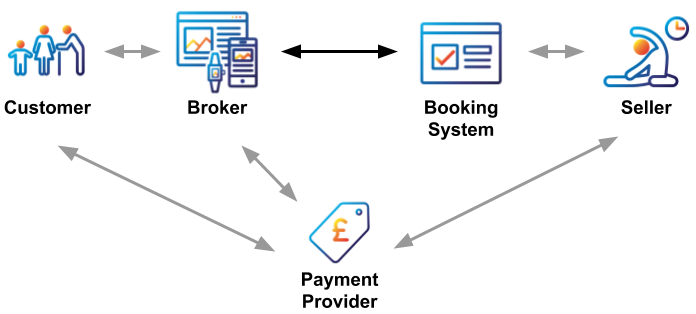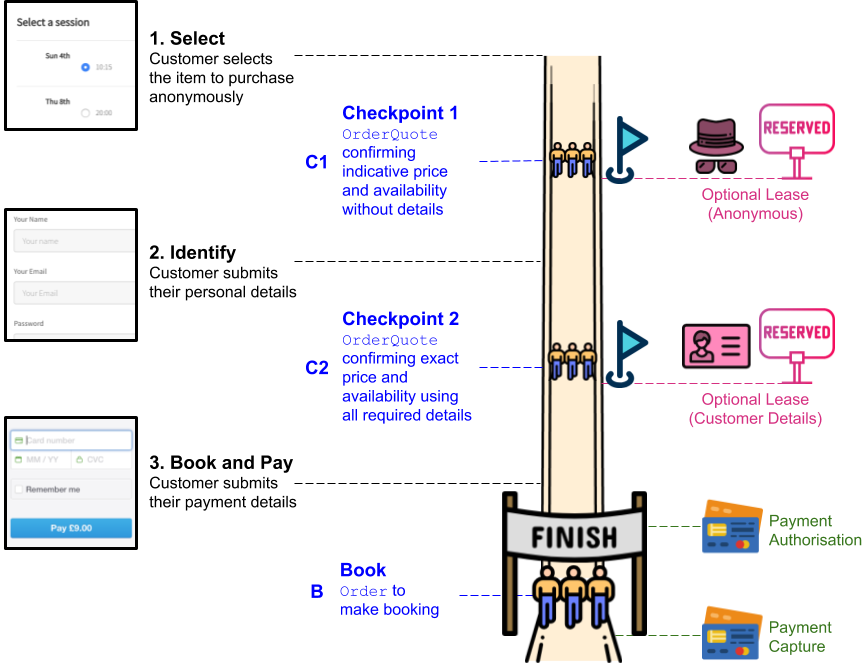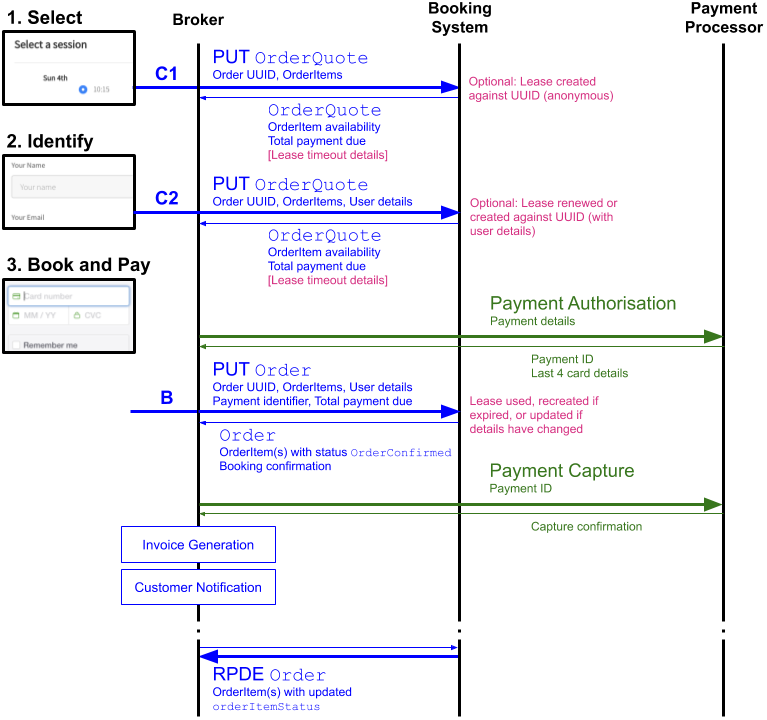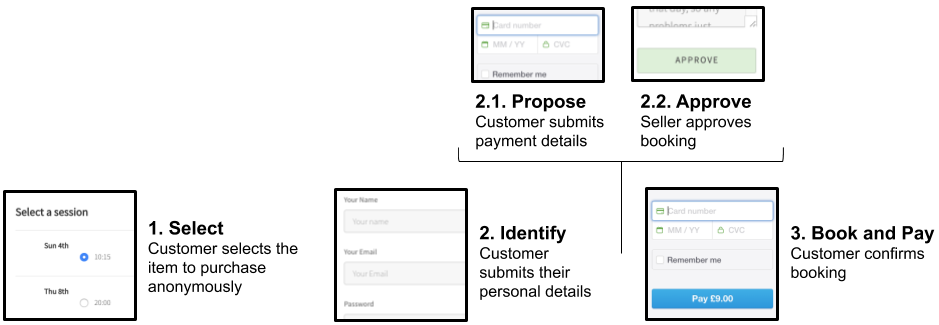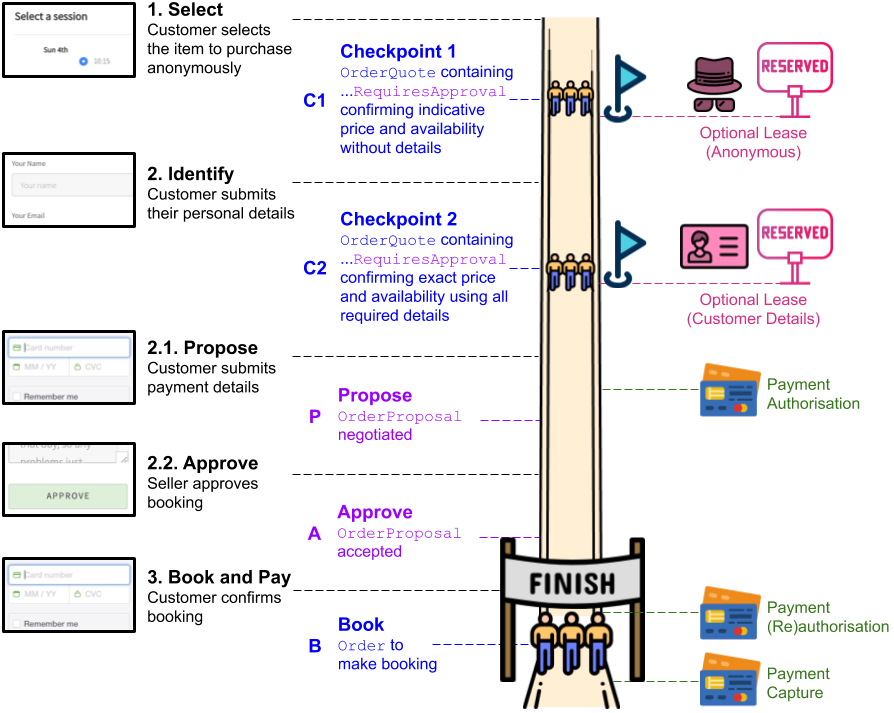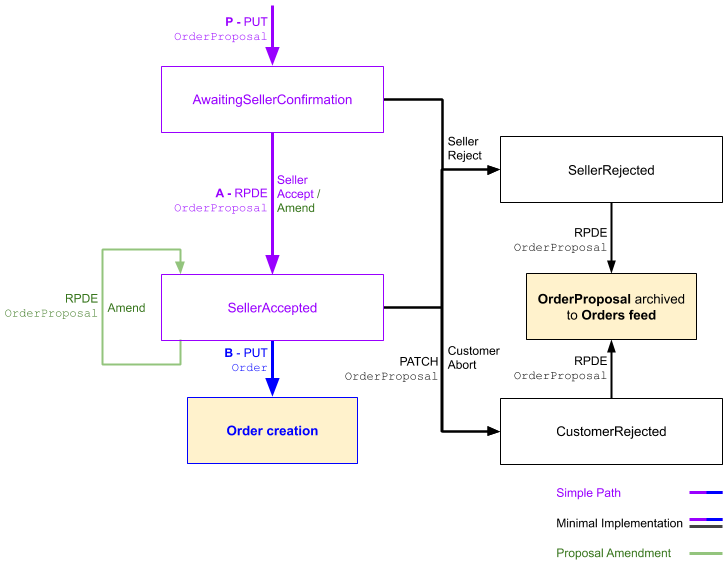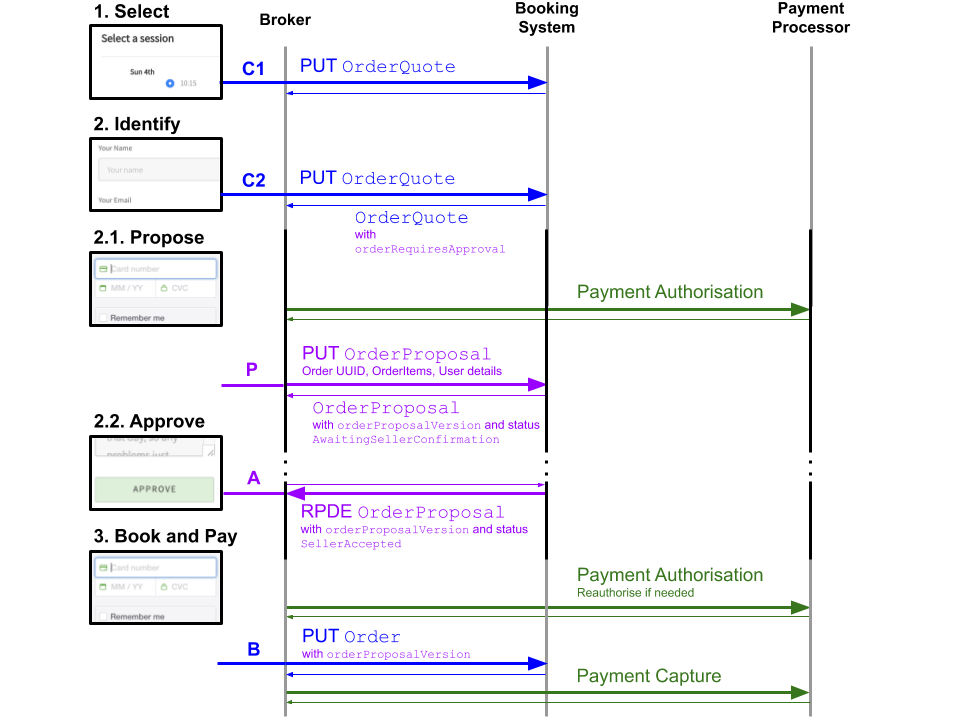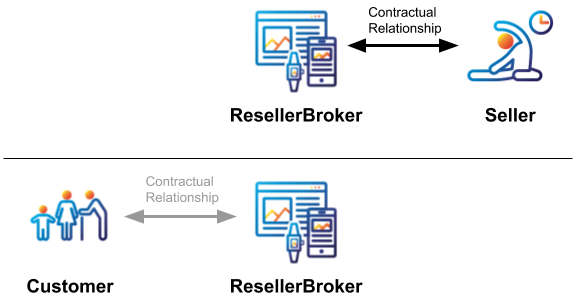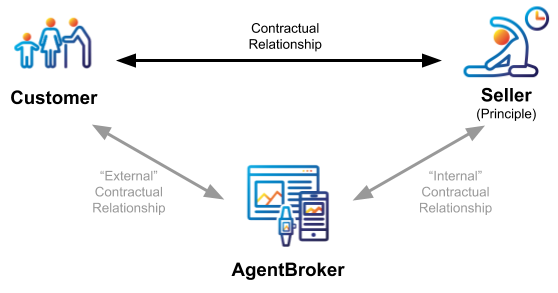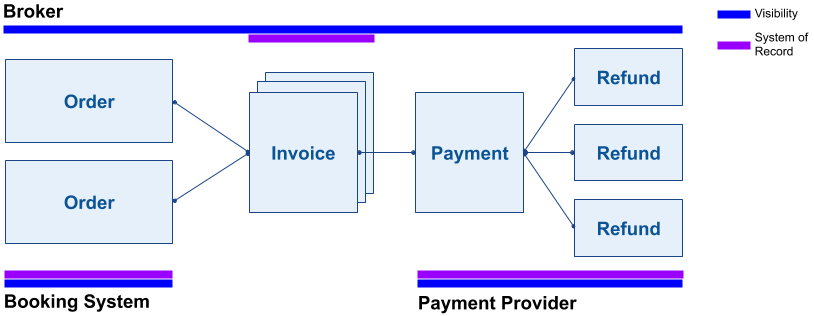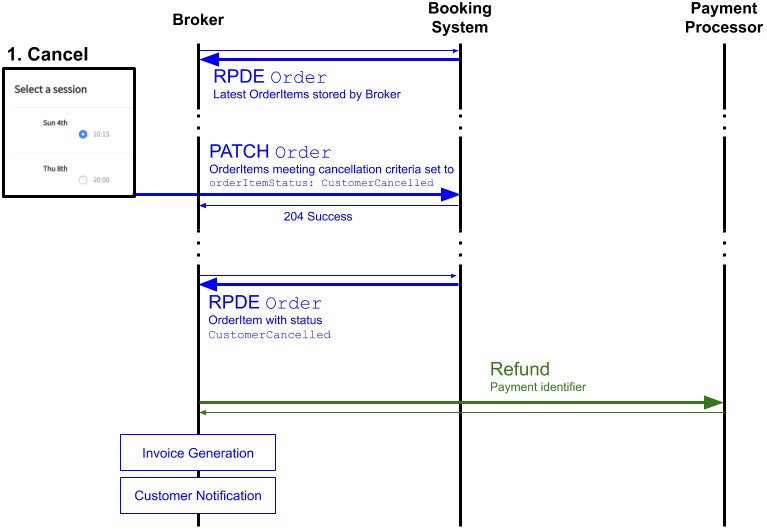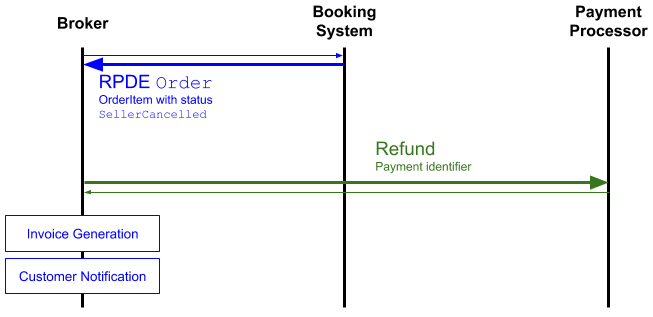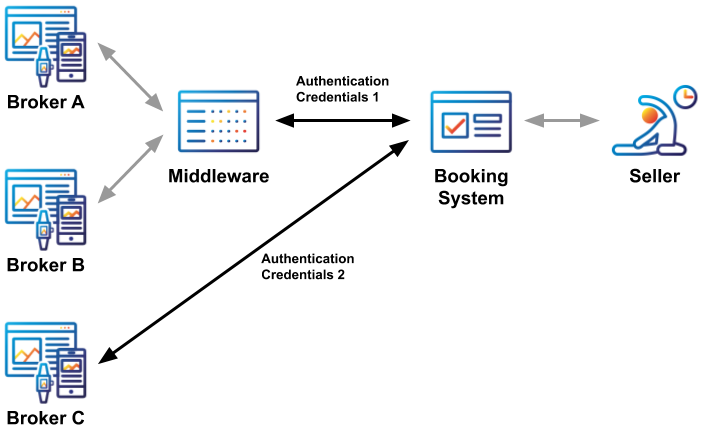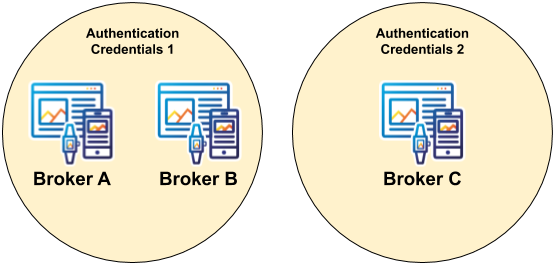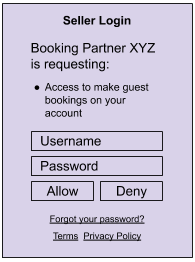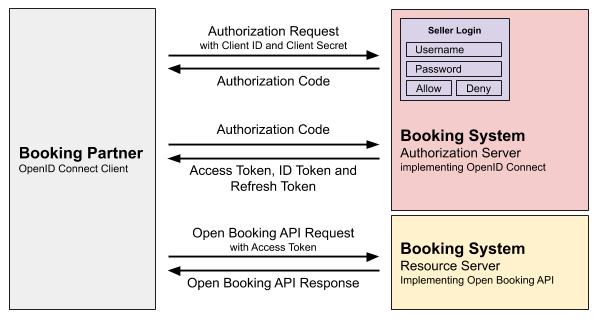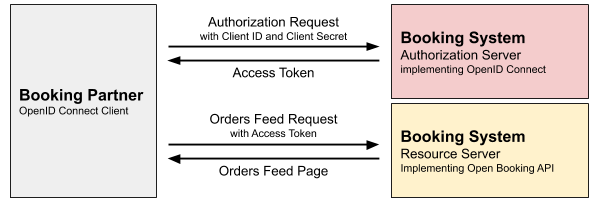This section includes request and response examples for each of the endpoints specified in this API.
9.2.1 OrderQuote Creation C1
| Endpoint Name |
Status |
Returns Body |
Resource |
HTTP Verb |
Relative Path |
| OrderQuote Creation C1 |
REQUIRED |
Yes |
OrderQuote |
PUT |
/order-quote-templates/{uuid} |
The C1 is an endpoint that accepts an OrderQuote without a customer object to check availability and confirm that the specific combination of OrderItems requested can be purchased.
A PUT request to this endpoint of the Booking System with an object of type OrderQuote will return an OrderQuote which represents a "dry run" of the booking, with the state of the Order nearly identical to the result of B (except it excludes customer, attendee, orderItemIntakeFormResponse and the payment identifier), without any side effects (with the exception of optional leasing).
Note that in a simple implementation that does not manage Lease state, attendee details, or additional details, C1 and C2 can be handled by the same underlying code that simply validates the email of the customer only if a customer value is supplied. Even for complex implementations, given the similarities between C1 and C2, much of the business logic can be shared between both.
Example 23: OrderQuote Creation C1: example request
PUT /api/order-quote-templates/e11429ea-467f-4270-ab62-e47368996fe8 HTTP/1.1
Host: example.com
Date: Mon, 8 Oct 2018 20:52:35 GMT
Accept: application/vnd.openactive.booking+json; version=1
{
"@context": "https://openactive.io/",
"@type": "OrderQuote",
"brokerRole": "https://openactive.io/AgentBroker",
"broker": {
"@type": "Organization",
"name": "MyFitnessApp",
"url": "https://myfitnessapp.example.com",
"description": "A fitness app for all the community",
"logo": {
"@type": "ImageObject",
"url": "http://data.myfitnessapp.org.uk/images/logo.png"
},
"address": {
"@type": "PostalAddress",
"streetAddress": "Alan Peacock Way",
"addressLocality": "Village East",
"addressRegion": "Middlesbrough",
"postalCode": "TS4 3AE",
"addressCountry": "GB"
}
},
"seller": {
"@type": "Organization",
"@id": "https://example.com/api/organisations/123"
},
"orderedItem": [
{
"@type": "OrderItem",
"position": 0,
"acceptedOffer": {
"@type": "Offer",
"@id": "https://example.com/events/452#/offers/878"
},
"orderedItem": {
"@type": "ScheduledSession",
"@id": "https://example.com/events/452/subEvents/132"
}
}
]
}
If successful the Booking System will respond with an OrderQuote:
Example 24: OrderQuote Creation C1: example success response
HTTP/1.1 200 OK
Date: Mon, 8 Oct 2018 20:52:36 GMT
Content-Type: application/vnd.openactive.booking+json; version=1
{
"@context": "https://openactive.io/",
"@type": "OrderQuote",
"@id": "https://example.com/api/order-quotes/e11429ea-467f-4270-ab62-e47368996fe8",
"orderRequiresApproval": false,
"brokerRole": "https://openactive.io/AgentBroker",
"broker": {
"@type": "Organization",
"name": "MyFitnessApp",
"url": "https://myfitnessapp.example.com",
"description": "A fitness app for all the community",
"logo": {
"@type": "ImageObject",
"url": "http://data.myfitnessapp.org.uk/images/logo.png"
},
"address": {
"@type": "PostalAddress",
"streetAddress": "Alan Peacock Way",
"addressLocality": "Village East",
"addressRegion": "Middlesbrough",
"postalCode": "TS4 3AE",
"addressCountry": "GB"
}
},
"seller": {
"@type": "Organization",
"@id": "https://example.com/api/organisations/123",
"identifier": "CRUOZWJ1",
"name": "Better",
"taxMode": "https://openactive.io/TaxGross",
"legalName": "Greenwich Leisure Limited",
"description": "A charitable social enterprise for all the community",
"url": "https://www.better.org.uk",
"logo": {
"@type": "ImageObject",
"url": "http://data.better.org.uk/images/logo.png"
},
"telephone": "020 3457 8700",
"email": "[email protected]",
"vatID": "GB 789 1234 56",
"address": {
"@type": "PostalAddress",
"streetAddress": "Alan Peacock Way",
"addressLocality": "Village East",
"addressRegion": "Middlesbrough",
"postalCode": "TS4 3AE",
"addressCountry": "GB"
},
"termsOfService": [
{
"@type": "PrivacyPolicy",
"name": "Privacy Policy",
"url": "https://example.com/privacy-policy",
"requiresExplicitConsent": false
},
{
"@type": "TermsOfUse",
"name": "Terms and Conditions",
"url": "https://example.com/terms-and-conditions",
"dateModified": "2019-04-16T20:31:13Z",
"requiresExplicitConsent": true
}
]
},
"bookingService": {
"@type": "BookingService",
"name": "Playwaze",
"url": "http://www.playwaze.com",
"termsOfService": [
{
"@type": "Terms",
"name": "Terms of Service",
"url": "https://brokerexample.com/terms.html",
"requiresExplicitConsent": false
}
]
},
"lease": {
"@type": "Lease",
"leaseExpires": "2018-10-01T11:00:00Z"
},
"orderedItem": [
{
"@type": "OrderItem",
"position": 0,
"allowCustomerCancellationFullRefund": true,
"unitTaxSpecification": [
{
"@type": "TaxChargeSpecification",
"name": "VAT at 20%",
"price": 1,
"priceCurrency": "GBP",
"rate": 0.2
}
],
"acceptedOffer": {
"@type": "Offer",
"@id": "https://example.com/events/452#/offers/878",
"description": "Winger space for Speedball.",
"name": "Speedball winger position",
"price": 10,
"priceCurrency": "GBP",
"validFromBeforeStartDate": "P6D",
"latestCancellationBeforeStartDate": "P1D"
},
"orderedItem": {
"@type": "ScheduledSession",
"@id": "https://example.com/events/452/subEvents/132",
"identifier": 123,
"eventStatus": "https://schema.org/EventScheduled",
"maximumAttendeeCapacity": 30,
"remainingAttendeeCapacity": 20,
"startDate": "2018-10-30T11:00:00Z",
"endDate": "2018-10-30T12:00:00Z",
"duration": "PT1H",
"superEvent": {
"@type": "SessionSeries",
"@id": "https://api.example.com/events/452",
"name": "Bodypump",
"activity": [
{
"type": "Concept",
"id": "https://openactive.io/activity-list#5e78bcbe-36db-425a-9064-bf96d09cc351",
"prefLabel": "Bodypump™",
"inScheme": "https://openactive.io/activity-list"
}
],
"duration": "PT1H",
"url": "https://example.com/events/452",
"location": {
"@type": "Place",
"url": "https://www.everyoneactive.com/centres/Middlesbrough-Sports-Village",
"name": "Middlesbrough Sports Village",
"identifier": "0140",
"address": {
"@type": "PostalAddress",
"streetAddress": "Alan Peacock Way",
"addressLocality": "Village East",
"addressRegion": "Middlesbrough",
"postalCode": "TS4 3AE",
"addressCountry": "GB"
},
"geo": {
"@type": "GeoCoordinates",
"latitude": 54.543964,
"longitude": -1.20978500000001
}
}
}
}
}
],
"totalPaymentDue": {
"@type": "PriceSpecification",
"price": 5,
"priceCurrency": "GBP"
},
"totalPaymentTax": [
{
"@type": "TaxChargeSpecification",
"name": "VAT at 20%",
"price": 1,
"priceCurrency": "GBP",
"rate": 0.2
}
]
}
If there are any issues with the OrderItems requested in the OrderQuote, the Booking System MUST respond with a 409 Conflict response (as the error is expected to be resolved, and the request resubmitted, as per [RFC2616]), with error details provided against each offending OrderItem. Note that totalPaymentDue and totalPaymentTax MUST be calculated including any OrderItems that exclusively contain IncompleteAttendeeDetailsError or IncompleteIntakeFormError errors, and excluding any OrderItems that include any other errors.
Example 25: OrderQuote Creation C1: example OrderItem error response
HTTP/1.1 409 Conflict
Date: Mon, 8 Oct 2018 20:52:36 GMT
Content-Type: application/vnd.openactive.booking+json; version=1
{
"@context": "https://openactive.io/",
"@type": "OrderQuote",
"@id": "https://example.com/api/order-quotes/e11429ea-467f-4270-ab62-e47368996fe8",
"orderRequiresApproval": false,
"brokerRole": "https://openactive.io/AgentBroker",
"broker": {
"@type": "Organization",
"name": "MyFitnessApp",
"url": "https://myfitnessapp.example.com",
"description": "A fitness app for all the community",
"logo": {
"@type": "ImageObject",
"url": "http://data.myfitnessapp.org.uk/images/logo.png"
},
"address": {
"@type": "PostalAddress",
"streetAddress": "Alan Peacock Way",
"addressLocality": "Village East",
"addressRegion": "Middlesbrough",
"postalCode": "TS4 3AE",
"addressCountry": "GB"
}
},
"seller": {
"@type": "Organization",
"@id": "https://example.com/api/organisations/123",
"identifier": "CRUOZWJ1",
"name": "Better",
"taxMode": "https://openactive.io/TaxGross",
"legalName": "Greenwich Leisure Limited",
"description": "A charitable social enterprise for all the community",
"url": "https://www.better.org.uk",
"logo": {
"@type": "ImageObject",
"url": "http://data.better.org.uk/images/logo.png"
},
"telephone": "020 3457 8700",
"email": "[email protected]",
"vatID": "GB 789 1234 56",
"address": {
"@type": "PostalAddress",
"streetAddress": "Alan Peacock Way",
"addressLocality": "Village East",
"addressRegion": "Middlesbrough",
"postalCode": "TS4 3AE",
"addressCountry": "GB"
},
"termsOfService": [
{
"@type": "PrivacyPolicy",
"name": "Privacy Policy",
"url": "https://example.com/privacy-policy",
"requiresExplicitConsent": false
},
{
"@type": "TermsOfUse",
"name": "Terms and Conditions",
"url": "https://example.com/terms-and-conditions",
"dateModified": "2019-04-16T20:31:13Z",
"requiresExplicitConsent": true
}
]
},
"bookingService": {
"@type": "BookingService",
"name": "Playwaze",
"url": "http://www.playwaze.com",
"termsOfService": [
{
"@type": "Terms",
"name": "Terms of Service",
"url": "https://brokerexample.com/terms.html",
"requiresExplicitConsent": false
}
]
},
"lease": {
"@type": "Lease",
"leaseExpires": "2018-10-01T11:00:00Z"
},
"orderedItem": [
{
"@type": "OrderItem",
"position": 0,
"orderItemStatus": "https://openactive.io/OrderItemConfirmed",
"allowCustomerCancellationFullRefund": true,
"unitTaxSpecification": [
{
"@type": "TaxChargeSpecification",
"name": "VAT at 20%",
"price": 1,
"priceCurrency": "GBP",
"rate": 0.2
}
],
"acceptedOffer": {
"@type": "Offer",
"@id": "https://example.com/events/452#/offers/878",
"description": "Winger space for Speedball.",
"name": "Speedball winger position",
"price": 10,
"priceCurrency": "GBP",
"validFromBeforeStartDate": "P6D",
"latestCancellationBeforeStartDate": "P1D"
},
"orderedItem": {
"@type": "ScheduledSession",
"@id": "https://example.com/events/452/subEvents/132",
"identifier": 123,
"eventStatus": "https://schema.org/EventScheduled",
"maximumAttendeeCapacity": 30,
"remainingAttendeeCapacity": 20,
"startDate": "2018-10-30T11:00:00Z",
"endDate": "2018-10-30T12:00:00Z",
"duration": "PT1H",
"superEvent": {
"@type": "SessionSeries",
"@id": "https://api.example.com/events/452",
"name": "Bodypump",
"activity": [
{
"type": "Concept",
"id": "https://openactive.io/activity-list#5e78bcbe-36db-425a-9064-bf96d09cc351",
"prefLabel": "Bodypump™",
"inScheme": "https://openactive.io/activity-list"
}
],
"duration": "PT1H",
"url": "https://example.com/events/452",
"location": {
"@type": "Place",
"url": "https://www.everyoneactive.com/centres/Middlesbrough-Sports-Village",
"name": "Middlesbrough Sports Village",
"identifier": "0140",
"address": {
"@type": "PostalAddress",
"streetAddress": "Alan Peacock Way",
"addressLocality": "Village East",
"addressRegion": "Middlesbrough",
"postalCode": "TS4 3AE",
"addressCountry": "GB"
},
"geo": {
"@type": "GeoCoordinates",
"latitude": 54.543964,
"longitude": -1.20978500000001
}
}
}
},
"error": [
{
"@type": "OpportunityIsFullError",
"description": "There are no spaces remaining in this opportunity"
}
]
}
],
"totalPaymentDue": {
"@type": "PriceSpecification",
"price": 0,
"priceCurrency": "GBP"
},
"totalPaymentTax": [
{
"@type": "TaxChargeSpecification",
"name": "VAT at 20%",
"price": 0,
"priceCurrency": "GBP",
"rate": 0.2
}
]
}
If there are issues with other properties of the OrderQuote outside of orderedItem, the Booking System MUST respond with a JSON-LD response which includes only the appropriate OpenBookingError and the appropriate status code.
Example 26: OrderQuote Creation C1: example failure response
HTTP/1.1 500 Internal Server Error
Date: Mon, 8 Oct 2018 20:52:36 GMT
Content-Type: application/vnd.openactive.booking+json; version=1
{
"@context": "https://openactive.io/",
"@type": "TemporarilyUnableToProduceOrderQuoteError",
"description": "Temporary error occurred in the database"
}
9.2.2 OrderQuote Creation C2
| Endpoint Name |
Status |
Returns Body |
Resource |
HTTP Verb |
Relative Path |
| OrderQuote Creation C2 |
REQUIRED |
Yes |
OrderQuote |
PUT |
/order-quotes/{uuid} |
The C2 is PUT endpoint that accepts an OrderQuote with a customer object to check availability and confirm that the specific combination of OrderItems requested can be purchased.
A PUT request to this endpoint of the Booking System with an object of type OrderQuote will return an OrderQuote which represents a "dry run" of the booking, with the state of the Order nearly identical to the result of B (except it excludes payment identifier), without any side effects (with the exception of optional leasing).
Note that the Booking System MUST NOT store any personal information of the customer provided for the OrderQuote past the expiry of any associated Lease created.
Example 27: OrderQuote Creation C2: example request
PUT /api/order-quotes/e11429ea-467f-4270-ab62-e47368996fe8 HTTP/1.1
Host: example.com
Date: Mon, 8 Oct 2018 20:52:35 GMT
Accept: application/vnd.openactive.booking+json; version=1
{
"@context": "https://openactive.io/",
"@type": "OrderQuote",
"brokerRole": "https://openactive.io/AgentBroker",
"broker": {
"@type": "Organization",
"name": "MyFitnessApp",
"url": "https://myfitnessapp.example.com",
"description": "A fitness app for all the community",
"logo": {
"@type": "ImageObject",
"url": "http://data.myfitnessapp.org.uk/images/logo.png"
},
"address": {
"@type": "PostalAddress",
"streetAddress": "Alan Peacock Way",
"addressLocality": "Village East",
"addressRegion": "Middlesbrough",
"postalCode": "TS4 3AE",
"addressCountry": "GB"
}
},
"seller": {
"@type": "Organization",
"@id": "https://example.com/api/organisations/123"
},
"customer": {
"@type": "Person",
"email": "[email protected]",
"telephone": "020 811 8055",
"givenName": "Geoff",
"familyName": "Capes"
},
"orderedItem": [
{
"@type": "OrderItem",
"position": 0,
"acceptedOffer": {
"@type": "Offer",
"@id": "https://example.com/events/452#/offers/878"
},
"orderedItem": {
"@type": "ScheduledSession",
"@id": "https://example.com/events/452/subEvents/132"
}
}
]
}
If successful the Booking System will respond with an OrderQuote:
Example 28: OrderQuote Creation C2: example success response
HTTP/1.1 200 OK
Date: Mon, 8 Oct 2018 20:52:36 GMT
Content-Type: application/vnd.openactive.booking+json; version=1
{
"@context": "https://openactive.io/",
"@type": "OrderQuote",
"@id": "https://example.com/api/order-quotes/e11429ea-467f-4270-ab62-e47368996fe8",
"orderRequiresApproval": false,
"brokerRole": "https://openactive.io/AgentBroker",
"broker": {
"@type": "Organization",
"name": "MyFitnessApp",
"url": "https://myfitnessapp.example.com",
"description": "A fitness app for all the community",
"logo": {
"@type": "ImageObject",
"url": "http://data.myfitnessapp.org.uk/images/logo.png"
},
"address": {
"@type": "PostalAddress",
"streetAddress": "Alan Peacock Way",
"addressLocality": "Village East",
"addressRegion": "Middlesbrough",
"postalCode": "TS4 3AE",
"addressCountry": "GB"
}
},
"seller": {
"@type": "Organization",
"@id": "https://example.com/api/organisations/123",
"identifier": "CRUOZWJ1",
"name": "Better",
"taxMode": "https://openactive.io/TaxGross",
"legalName": "Greenwich Leisure Limited",
"description": "A charitable social enterprise for all the community",
"url": "https://www.better.org.uk",
"logo": {
"@type": "ImageObject",
"url": "http://data.better.org.uk/images/logo.png"
},
"telephone": "020 3457 8700",
"email": "[email protected]",
"vatID": "GB 789 1234 56",
"address": {
"@type": "PostalAddress",
"streetAddress": "Alan Peacock Way",
"addressLocality": "Village East",
"addressRegion": "Middlesbrough",
"postalCode": "TS4 3AE",
"addressCountry": "GB"
},
"termsOfService": [
{
"@type": "PrivacyPolicy",
"name": "Privacy Policy",
"url": "https://example.com/privacy-policy",
"requiresExplicitConsent": false
},
{
"@type": "TermsOfUse",
"name": "Terms and Conditions",
"url": "https://example.com/terms-and-conditions",
"dateModified": "2019-04-16T20:31:13Z",
"requiresExplicitConsent": true
}
]
},
"customer": {
"@type": "Person",
"email": "[email protected]",
"telephone": "020 811 8055",
"givenName": "Geoff",
"familyName": "Capes"
},
"bookingService": {
"@type": "BookingService",
"name": "Playwaze",
"url": "http://www.playwaze.com",
"termsOfService": [
{
"@type": "Terms",
"name": "Terms of Service",
"url": "https://brokerexample.com/terms.html",
"requiresExplicitConsent": false
}
]
},
"lease": {
"@type": "Lease",
"leaseExpires": "2018-10-01T11:00:00Z"
},
"orderedItem": [
{
"@type": "OrderItem",
"position": 0,
"allowCustomerCancellationFullRefund": true,
"unitTaxSpecification": [
{
"@type": "TaxChargeSpecification",
"name": "VAT at 20%",
"price": 1,
"priceCurrency": "GBP",
"rate": 0.2
}
],
"acceptedOffer": {
"@type": "Offer",
"@id": "https://example.com/events/452#/offers/878",
"description": "Winger space for Speedball.",
"name": "Speedball winger position",
"price": 10,
"priceCurrency": "GBP",
"validFromBeforeStartDate": "P6D",
"latestCancellationBeforeStartDate": "P1D"
},
"orderedItem": {
"@type": "ScheduledSession",
"@id": "https://example.com/events/452/subEvents/132",
"identifier": 123,
"eventStatus": "https://schema.org/EventScheduled",
"maximumAttendeeCapacity": 30,
"remainingAttendeeCapacity": 20,
"startDate": "2018-10-30T11:00:00Z",
"endDate": "2018-10-30T12:00:00Z",
"duration": "PT1H",
"superEvent": {
"@type": "SessionSeries",
"@id": "https://api.example.com/events/452",
"name": "Bodypump",
"activity": [
{
"type": "Concept",
"id": "https://openactive.io/activity-list#5e78bcbe-36db-425a-9064-bf96d09cc351",
"prefLabel": "Bodypump™",
"inScheme": "https://openactive.io/activity-list"
}
],
"duration": "PT1H",
"url": "https://example.com/events/452",
"location": {
"@type": "Place",
"url": "https://www.everyoneactive.com/centres/Middlesbrough-Sports-Village",
"name": "Middlesbrough Sports Village",
"identifier": "0140",
"address": {
"@type": "PostalAddress",
"streetAddress": "Alan Peacock Way",
"addressLocality": "Village East",
"addressRegion": "Middlesbrough",
"postalCode": "TS4 3AE",
"addressCountry": "GB"
},
"geo": {
"@type": "GeoCoordinates",
"latitude": 54.543964,
"longitude": -1.20978500000001
}
}
}
}
}
],
"totalPaymentDue": {
"@type": "PriceSpecification",
"price": 5,
"priceCurrency": "GBP"
},
"totalPaymentTax": [
{
"@type": "TaxChargeSpecification",
"name": "VAT at 20%",
"price": 1,
"priceCurrency": "GBP",
"rate": 0.2
}
]
}
Note if the response includes orderRequiresApproval with a value of true the Broker MUST make it clear to the Customer of the additional process they are about to enter into, and once they are aware, move forward according to the Booking Flow with Approval rather than the Simple Booking Flow.
If there are any issues with the OrderItems requested in the OrderQuote, the Booking System MUST respond with a 409 Conflict response (as the error is expected to be resolved, and the request resubmitted, as per [RFC2616]), with error details provided against each offending OrderItem. Note that totalPaymentDue and totalPaymentTax MUST be calculated including any OrderItems that exclusively contain IncompleteAttendeeDetailsError or IncompleteIntakeFormError errors, and excluding any OrderItems that include any other errors.
Example 29: OrderQuote Creation C2: example OrderItem error response
HTTP/1.1 409 Conflict
Date: Mon, 8 Oct 2018 20:52:36 GMT
Content-Type: application/vnd.openactive.booking+json; version=1
{
"@context": "https://openactive.io/",
"@type": "OrderQuote",
"@id": "https://example.com/api/order-quotes/e11429ea-467f-4270-ab62-e47368996fe8",
"orderRequiresApproval": false,
"brokerRole": "https://openactive.io/AgentBroker",
"broker": {
"@type": "Organization",
"name": "MyFitnessApp",
"url": "https://myfitnessapp.example.com",
"description": "A fitness app for all the community",
"logo": {
"@type": "ImageObject",
"url": "http://data.myfitnessapp.org.uk/images/logo.png"
},
"address": {
"@type": "PostalAddress",
"streetAddress": "Alan Peacock Way",
"addressLocality": "Village East",
"addressRegion": "Middlesbrough",
"postalCode": "TS4 3AE",
"addressCountry": "GB"
}
},
"seller": {
"@type": "Organization",
"@id": "https://example.com/api/organisations/123",
"identifier": "CRUOZWJ1",
"name": "Better",
"taxMode": "https://openactive.io/TaxGross",
"legalName": "Greenwich Leisure Limited",
"description": "A charitable social enterprise for all the community",
"url": "https://www.better.org.uk",
"logo": {
"@type": "ImageObject",
"url": "http://data.better.org.uk/images/logo.png"
},
"telephone": "020 3457 8700",
"email": "[email protected]",
"vatID": "GB 789 1234 56",
"address": {
"@type": "PostalAddress",
"streetAddress": "Alan Peacock Way",
"addressLocality": "Village East",
"addressRegion": "Middlesbrough",
"postalCode": "TS4 3AE",
"addressCountry": "GB"
},
"termsOfService": [
{
"@type": "PrivacyPolicy",
"name": "Privacy Policy",
"url": "https://example.com/privacy-policy",
"requiresExplicitConsent": false
},
{
"@type": "TermsOfUse",
"name": "Terms and Conditions",
"url": "https://example.com/terms-and-conditions",
"dateModified": "2019-04-16T20:31:13Z",
"requiresExplicitConsent": true
}
]
},
"customer": {
"@type": "Person",
"email": "[email protected]",
"telephone": "020 811 8055",
"givenName": "Geoff",
"familyName": "Capes"
},
"bookingService": {
"@type": "BookingService",
"name": "Playwaze",
"url": "http://www.playwaze.com",
"termsOfService": [
{
"@type": "Terms",
"name": "Terms of Service",
"url": "https://brokerexample.com/terms.html",
"requiresExplicitConsent": false
}
]
},
"lease": {
"@type": "Lease",
"leaseExpires": "2018-10-01T11:00:00Z"
},
"orderedItem": [
{
"@type": "OrderItem",
"position": 0,
"orderItemStatus": "https://openactive.io/OrderItemConfirmed",
"allowCustomerCancellationFullRefund": true,
"unitTaxSpecification": [
{
"@type": "TaxChargeSpecification",
"name": "VAT at 20%",
"price": 1,
"priceCurrency": "GBP",
"rate": 0.2
}
],
"acceptedOffer": {
"@type": "Offer",
"@id": "https://example.com/events/452#/offers/878",
"description": "Winger space for Speedball.",
"name": "Speedball winger position",
"price": 10,
"priceCurrency": "GBP",
"validFromBeforeStartDate": "P6D",
"latestCancellationBeforeStartDate": "P1D"
},
"orderedItem": {
"@type": "ScheduledSession",
"@id": "https://example.com/events/452/subEvents/132",
"identifier": 123,
"eventStatus": "https://schema.org/EventScheduled",
"maximumAttendeeCapacity": 30,
"remainingAttendeeCapacity": 20,
"startDate": "2018-10-30T11:00:00Z",
"endDate": "2018-10-30T12:00:00Z",
"duration": "PT1H",
"superEvent": {
"@type": "SessionSeries",
"@id": "https://api.example.com/events/452",
"name": "Bodypump",
"activity": [
{
"type": "Concept",
"id": "https://openactive.io/activity-list#5e78bcbe-36db-425a-9064-bf96d09cc351",
"prefLabel": "Bodypump™",
"inScheme": "https://openactive.io/activity-list"
}
],
"duration": "PT1H",
"url": "https://example.com/events/452",
"location": {
"@type": "Place",
"url": "https://www.everyoneactive.com/centres/Middlesbrough-Sports-Village",
"name": "Middlesbrough Sports Village",
"identifier": "0140",
"address": {
"@type": "PostalAddress",
"streetAddress": "Alan Peacock Way",
"addressLocality": "Village East",
"addressRegion": "Middlesbrough",
"postalCode": "TS4 3AE",
"addressCountry": "GB"
},
"geo": {
"@type": "GeoCoordinates",
"latitude": 54.543964,
"longitude": -1.20978500000001
}
}
}
},
"error": [
{
"@type": "OpportunityIsFullError",
"description": "There are no spaces remaining in this opportunity"
}
]
}
],
"totalPaymentDue": {
"@type": "PriceSpecification",
"price": 0,
"priceCurrency": "GBP"
},
"totalPaymentTax": [
{
"@type": "TaxChargeSpecification",
"name": "VAT at 20%",
"price": 0,
"priceCurrency": "GBP",
"rate": 0.2
}
]
}
If there are issues with other properties of the OrderQuote outside of orderedItem, the Booking System MUST respond with a JSON-LD response which includes only the appropriate OpenBookingError and the appropriate status code.
Example 30: OrderQuote Creation C2: example failure response
HTTP/1.1 500 Internal Server Error
Date: Mon, 8 Oct 2018 20:52:36 GMT
Content-Type: application/vnd.openactive.booking+json; version=1
{
"@context": "https://openactive.io/",
"@type": "TemporarilyUnableToProduceOrderQuoteError",
"description": "Temporary error occurred in the database"
}
9.2.4 OrderProposal Creation P
| Endpoint Name |
Status |
Returns Body |
Resource |
HTTP Verb |
Relative Path |
| OrderProposal Creation P |
OPTIONAL |
Yes |
OrderProposal |
PUT |
/order-proposals/{uuid} |
P is a PUT endpoint that creates and returns the submitted OrderProposal with an orderProposalStatus of https://openactive.io/AwaitingSellerConfirmation. The details submitted are identical to those required for B with the addition of an optional lease.
Example 33: OrderProposal Creation: example request
PUT /api/order-proposals/e11429ea-467f-4270-ab62-e47368996fe8 HTTP/1.1
Host: example.com
Date: Mon, 8 Oct 2018 20:52:35 GMT
Accept: application/vnd.openactive.booking+json; version=1
{
"@context": "https://openactive.io/",
"@type": "OrderProposal",
"brokerRole": "https://openactive.io/AgentBroker",
"broker": {
"@type": "Organization",
"name": "MyFitnessApp",
"url": "https://myfitnessapp.example.com",
"description": "A fitness app for all the community",
"logo": {
"@type": "ImageObject",
"url": "http://data.myfitnessapp.org.uk/images/logo.png"
},
"address": {
"@type": "PostalAddress",
"streetAddress": "Alan Peacock Way",
"addressLocality": "Village East",
"addressRegion": "Middlesbrough",
"postalCode": "TS4 3AE",
"addressCountry": "GB"
}
},
"seller": {
"@type": "Organization",
"@id": "https://example.com/api/organisations/123"
},
"customer": {
"@type": "Person",
"email": "[email protected]",
"telephone": "020 811 8055",
"givenName": "Geoff",
"familyName": "Capes"
},
"orderedItem": [
{
"@type": "OrderItem",
"position": 0,
"acceptedOffer": {
"@type": "Offer",
"@id": "https://example.com/events/452#/offers/878"
},
"orderedItem": {
"@type": "ScheduledSession",
"@id": "https://example.com/events/452/subEvents/132"
}
}
],
"totalPaymentDue": {
"@type": "PriceSpecification",
"price": 5,
"priceCurrency": "GBP"
},
"payment": {
"@type": "Payment",
"name": "AcmeBroker Points",
"identifier": "1234567890npduy2f"
}
}
If successful the Booking System will respond with an OrderProposal:
Example 34: OrderProposal Creation: example success response
HTTP/1.1 201 Created
Date: Mon, 8 Oct 2018 20:52:36 GMT
Content-Type: application/vnd.openactive.booking+json; version=1
Location: /api/order-proposals/e11429ea-467f-4270-ab62-e47368996fe8
{
"@context": "https://openactive.io/",
"@type": "OrderProposal",
"@id": "https://example.com/api/order-proposals/e11429ea-467f-4270-ab62-e47368996fe8",
"orderNumber": "AB000001",
"orderProposalVersion": "https://example.com/api/order-proposals/e11429ea-467f-4270-ab62-e47368996fe8/versions/8eb1a6ce-3f5b-40b0-87a7-bddb4c5518bd",
"orderProposalStatus": "https://openactive.io/AwaitingSellerConfirmation",
"brokerRole": "https://openactive.io/AgentBroker",
"broker": {
"@type": "Organization",
"name": "MyFitnessApp",
"url": "https://myfitnessapp.example.com",
"description": "A fitness app for all the community",
"logo": {
"@type": "ImageObject",
"url": "http://data.myfitnessapp.org.uk/images/logo.png"
},
"address": {
"@type": "PostalAddress",
"streetAddress": "Alan Peacock Way",
"addressLocality": "Village East",
"addressRegion": "Middlesbrough",
"postalCode": "TS4 3AE",
"addressCountry": "GB"
}
},
"seller": {
"@type": "Organization",
"@id": "https://example.com/api/organisations/123",
"identifier": "CRUOZWJ1",
"name": "Better",
"taxMode": "https://openactive.io/TaxGross",
"legalName": "Greenwich Leisure Limited",
"description": "A charitable social enterprise for all the community",
"url": "https://www.better.org.uk",
"logo": {
"@type": "ImageObject",
"url": "http://data.better.org.uk/images/logo.png"
},
"telephone": "020 3457 8700",
"email": "[email protected]",
"vatID": "GB 789 1234 56",
"address": {
"@type": "PostalAddress",
"streetAddress": "Alan Peacock Way",
"addressLocality": "Village East",
"addressRegion": "Middlesbrough",
"postalCode": "TS4 3AE",
"addressCountry": "GB"
},
"termsOfService": [
{
"@type": "PrivacyPolicy",
"name": "Privacy Policy",
"url": "https://example.com/privacy-policy",
"requiresExplicitConsent": false
},
{
"@type": "TermsOfUse",
"name": "Terms and Conditions",
"url": "https://example.com/terms-and-conditions",
"dateModified": "2019-04-16T20:31:13Z",
"requiresExplicitConsent": true
}
]
},
"customer": {
"@type": "Person",
"email": "[email protected]",
"telephone": "020 811 8055",
"givenName": "Geoff",
"familyName": "Capes"
},
"bookingService": {
"@type": "BookingService",
"name": "Playwaze",
"url": "http://www.playwaze.com",
"termsOfService": [
{
"@type": "Terms",
"name": "Terms of Service",
"url": "https://brokerexample.com/terms.html",
"requiresExplicitConsent": false
}
]
},
"orderedItem": [
{
"@type": "OrderItem",
"position": 0,
"orderItemStatus": "https://openactive.io/OrderItemProposed",
"unitTaxSpecification": [
{
"@type": "TaxChargeSpecification",
"name": "VAT at 20%",
"price": 1,
"priceCurrency": "GBP",
"rate": 0.2
}
],
"acceptedOffer": {
"@type": "Offer",
"@id": "https://example.com/events/452#/offers/878",
"description": "Winger space for Speedball.",
"name": "Speedball winger position",
"price": 10,
"priceCurrency": "GBP",
"validFromBeforeStartDate": "P6D",
"latestCancellationBeforeStartDate": "P1D"
},
"orderedItem": {
"@type": "ScheduledSession",
"@id": "https://example.com/events/452/subEvents/132",
"identifier": 123,
"eventStatus": "https://schema.org/EventScheduled",
"startDate": "2018-10-30T11:00:00Z",
"endDate": "2018-10-30T12:00:00Z",
"duration": "PT1H",
"superEvent": {
"@type": "SessionSeries",
"@id": "https://api.example.com/events/452",
"name": "Bodypump",
"activity": [
{
"type": "Concept",
"id": "https://openactive.io/activity-list#5e78bcbe-36db-425a-9064-bf96d09cc351",
"prefLabel": "Bodypump™",
"inScheme": "https://openactive.io/activity-list"
}
],
"url": "https://example.com/events/452",
"location": {
"@type": "Place",
"url": "https://www.everyoneactive.com/centres/Middlesbrough-Sports-Village",
"name": "Middlesbrough Sports Village",
"identifier": "0140",
"address": {
"@type": "PostalAddress",
"streetAddress": "Alan Peacock Way",
"addressLocality": "Village East",
"addressRegion": "Middlesbrough",
"postalCode": "TS4 3AE",
"addressCountry": "GB"
},
"geo": {
"@type": "GeoCoordinates",
"latitude": 54.543964,
"longitude": -1.20978500000001
}
}
}
}
}
],
"totalPaymentDue": {
"@type": "PriceSpecification",
"price": 5,
"priceCurrency": "GBP"
},
"totalPaymentTax": [
{
"@type": "TaxChargeSpecification",
"name": "VAT at 20%",
"price": 1,
"priceCurrency": "GBP",
"rate": 0.2
}
],
"payment": {
"@type": "Payment",
"name": "AcmeBroker Points",
"identifier": "1234567890npduy2f"
},
"lease": {
"@type": "Lease",
"leaseExpires": "2018-10-01T11:00:00Z"
}
}
If there are issues with any properties of the OrderProposal, including the orderedItem, the Booking System MUST respond with an error response which includes only the appropriate OpenBookingError and the appropriate status code. The Broker is expected to retry the OrderQuote to get specific orderedItem level errors.
Example 35: OrderProposal Creation: example failure response
HTTP/1.1 400 Bad Request
Date: Mon, 8 Oct 2018 20:52:36 GMT
Content-Type: application/vnd.openactive.booking+json; version=1
{
"@context": "https://openactive.io/",
"@type": "IncompleteBrokerDetailsError",
"description": "Only 'https://openactive.io/CustomerRejected' is permitted for this property."
}
Note that any validation errors raised at P regarding any property values MUST also be raised at C2 (and ideally also C1 if relevant), so it should be very unusual to receive an error at P.
9.2.6 Order Creation B
| Endpoint Name |
Status |
Returns Body |
Resource |
HTTP Verb |
Relative Path |
| Order Creation B |
REQUIRED |
Yes |
Order |
PUT |
/orders/{uuid} |
A PUT request to the Order Creation endpoint of the Booking System with an object of type Order will create the Order and complete the booking from the point of the view of the Booking System.
PUT /api/orders/e11429ea-467f-4270-ab62-e47368996fe8 HTTP/1.1
Host: example.com
Date: Mon, 8 Oct 2018 20:52:35 GMT
Accept: application/vnd.openactive.booking+json; version=1
{
"@context": "https://openactive.io/",
"@type": "Order",
"brokerRole": "https://openactive.io/AgentBroker",
"broker": {
"@type": "Organization",
"name": "MyFitnessApp",
"url": "https://myfitnessapp.example.com",
"description": "A fitness app for all the community",
"logo": {
"@type": "ImageObject",
"url": "http://data.myfitnessapp.org.uk/images/logo.png"
},
"address": {
"@type": "PostalAddress",
"streetAddress": "Alan Peacock Way",
"addressLocality": "Village East",
"addressRegion": "Middlesbrough",
"postalCode": "TS4 3AE",
"addressCountry": "GB"
}
},
"seller": {
"@type": "Organization",
"@id": "https://example.com/api/organisations/123"
},
"customer": {
"@type": "Person",
"email": "[email protected]",
"telephone": "020 811 8055",
"givenName": "Geoff",
"familyName": "Capes"
},
"orderedItem": [
{
"@type": "OrderItem",
"position": 0,
"acceptedOffer": {
"@type": "Offer",
"@id": "https://example.com/events/452#/offers/878"
},
"orderedItem": {
"@type": "ScheduledSession",
"@id": "https://example.com/events/452/subEvents/132"
}
}
],
"totalPaymentDue": {
"@type": "PriceSpecification",
"price": 5,
"priceCurrency": "GBP"
},
"payment": {
"@type": "Payment",
"name": "AcmeBroker Points",
"identifier": "1234567890npduy2f"
}
}
If successful the server will respond with the location of a newly created Order resource.
For the Order response and the Orders feed, the OrderItems MUST include a unique @idOrderItems to be referenced in subsequent PATCH calls once the Order has been created.
B responses MUST reflect back properties provided by the Booking System, for example:
HTTP/1.1 201 Created
Date: Mon, 8 Oct 2018 20:52:36 GMT
Content-Type: application/vnd.openactive.booking+json; version=1
Location: /api/orders/e11429ea-467f-4270-ab62-e47368996fe8
{
"@context": "https://openactive.io/",
"@type": "Order",
"@id": "https://example.com/api/orders/e11429ea-467f-4270-ab62-e47368996fe8",
"orderNumber": "AB000001",
"brokerRole": "https://openactive.io/AgentBroker",
"broker": {
"@type": "Organization",
"name": "MyFitnessApp",
"url": "https://myfitnessapp.example.com",
"description": "A fitness app for all the community",
"logo": {
"@type": "ImageObject",
"url": "http://data.myfitnessapp.org.uk/images/logo.png"
},
"address": {
"@type": "PostalAddress",
"streetAddress": "Alan Peacock Way",
"addressLocality": "Village East",
"addressRegion": "Middlesbrough",
"postalCode": "TS4 3AE",
"addressCountry": "GB"
}
},
"customer": {
"@type": "Person",
"email": "[email protected]",
"telephone": "020 811 8055",
"givenName": "Geoff",
"familyName": "Capes"
},
"seller": {
"@type": "Organization",
"@id": "https://example.com/api/organisations/123",
"identifier": "CRUOZWJ1",
"name": "Better",
"taxMode": "https://openactive.io/TaxGross",
"legalName": "Greenwich Leisure Limited",
"description": "A charitable social enterprise for all the community",
"url": "https://www.better.org.uk",
"logo": {
"@type": "ImageObject",
"url": "http://data.better.org.uk/images/logo.png"
},
"telephone": "020 3457 8700",
"email": "[email protected]",
"vatID": "GB 789 1234 56",
"address": {
"@type": "PostalAddress",
"streetAddress": "Alan Peacock Way",
"addressLocality": "Village East",
"addressRegion": "Middlesbrough",
"postalCode": "TS4 3AE",
"addressCountry": "GB"
},
"termsOfService": [
{
"@type": "PrivacyPolicy",
"name": "Privacy Policy",
"url": "https://example.com/privacy-policy",
"requiresExplicitConsent": false
},
{
"@type": "TermsOfUse",
"name": "Terms and Conditions",
"url": "https://example.com/terms-and-conditions",
"dateModified": "2019-04-16T20:31:13Z",
"requiresExplicitConsent": true
}
]
},
"bookingService": {
"@type": "BookingService",
"name": "Playwaze",
"url": "http://www.playwaze.com",
"termsOfService": [
{
"@type": "Terms",
"name": "Terms of Service",
"url": "https://brokerexample.com/terms.html",
"requiresExplicitConsent": false
}
]
},
"orderedItem": [
{
"@type": "OrderItem",
"@id": "https://example.com/api/orders/e11429ea-467f-4270-ab62-e47368996fe8#/orderedItem/1234",
"position": 0,
"orderItemStatus": "https://openactive.io/OrderItemConfirmed",
"allowCustomerCancellationFullRefund": true,
"unitTaxSpecification": [
{
"@type": "TaxChargeSpecification",
"name": "VAT at 20%",
"price": 1,
"priceCurrency": "GBP",
"rate": 0.2
}
],
"acceptedOffer": {
"@type": "Offer",
"@id": "https://example.com/events/452#/offers/878",
"description": "Winger space for Speedball.",
"name": "Speedball winger position",
"price": 10,
"priceCurrency": "GBP",
"validFromBeforeStartDate": "P6D",
"latestCancellationBeforeStartDate": "P1D"
},
"orderedItem": {
"@type": "ScheduledSession",
"@id": "https://example.com/events/452/subEvents/132",
"identifier": 123,
"eventStatus": "https://schema.org/EventScheduled",
"startDate": "2018-10-30T11:00:00Z",
"endDate": "2018-10-30T12:00:00Z",
"duration": "PT1H",
"superEvent": {
"@type": "SessionSeries",
"@id": "https://api.example.com/events/452",
"name": "Bodypump",
"activity": [
{
"type": "Concept",
"id": "https://openactive.io/activity-list#5e78bcbe-36db-425a-9064-bf96d09cc351",
"prefLabel": "Bodypump™",
"inScheme": "https://openactive.io/activity-list"
}
],
"url": "https://example.com/events/452",
"location": {
"@type": "Place",
"url": "https://www.everyoneactive.com/centres/Middlesbrough-Sports-Village",
"name": "Middlesbrough Sports Village",
"identifier": "0140",
"address": {
"@type": "PostalAddress",
"streetAddress": "Alan Peacock Way",
"addressLocality": "Village East",
"addressRegion": "Middlesbrough",
"postalCode": "TS4 3AE",
"addressCountry": "GB"
},
"geo": {
"@type": "GeoCoordinates",
"latitude": 54.543964,
"longitude": -1.20978500000001
}
}
}
},
"accessPass": [
{
"@type": "Barcode",
"text": "0123456789"
}
]
}
],
"totalPaymentDue": {
"@type": "PriceSpecification",
"price": 5,
"priceCurrency": "GBP"
},
"totalPaymentTax": [
{
"@type": "TaxChargeSpecification",
"name": "VAT at 20%",
"price": 1,
"priceCurrency": "GBP",
"rate": 0.2
}
],
"payment": {
"@type": "Payment",
"name": "AcmeBroker Points",
"identifier": "1234567890npduy2f"
}
}
Technical or conformance issues with any properties of the Order, including in an orderedItem, MUST cause the Booking System to respond with only the appropriate OpenBookingError and associated status code. Following an UnableToProcessOrderItemError or OpportunityHasInsufficientCapacityError, the Broker is expected to retry the OrderQuote at C2 to get specific orderedItem level errors. Any validation errors raised at B regarding any property values MUST also be raised at C2 (and ideally also C1 if relevant), so it should be very unusual to receive an error at B.
Example 42: Order Creation: example failure response
HTTP/1.1 409 Conflict
Date: Mon, 8 Oct 2018 20:52:36 GMT
Content-Type: application/vnd.openactive.booking+json; version=1
{
"@context": "https://openactive.io/",
"@type": "UnableToProcessOrderItemError",
"description": "An error occurred while processing the items within this booking."
}
For the Booking Flow with Approval specifically, the Broker decides to proceed from A to B by supplying a minimal Order to B that contains just the orderProposalVersion and any additional payment data if reauthorisation was required.
Example 43: Order Creation: example request from OrderProposal
PUT /api/orders/e11429ea-467f-4270-ab62-e47368996fe8 HTTP/1.1
Host: example.com
Date: Mon, 8 Oct 2018 20:52:35 GMT
Accept: application/vnd.openactive.booking+json; version=1
{
"@context": "https://openactive.io/",
"@type": "Order",
"orderProposalVersion": "https://example.com/api/order-proposals/e11429ea-467f-4270-ab62-e47368996fe8/versions/8eb1a6ce-3f5b-40b0-87a7-bddb4c5518bd",
"payment": {
"@type": "Payment",
"name": "AcmeBroker Points",
"identifier": "1234567890npduy2f"
}
}
9.2.8 Order Cancellation
| Endpoint Name |
Status |
Returns Body |
Resource |
HTTP Verb |
Relative Path |
| Order Cancellation |
REQUIRED |
|
Order |
PATCH |
/orders/{uuid} |
Cancellation of an Order may be requested by the Customer. OrderItems omitted from the PATCH request MUST be ignored.
Example 47: Order Cancellation: example Order request
PATCH /api/orders/e11429ea-467f-4270-ab62-e47368996fe8 HTTP/1.1
Host: example.com
Date: Mon, 8 Oct 2018 20:52:35 GMT
Accept: application/vnd.openactive.booking+json; version=1
{
"@context": "https://openactive.io/",
"@type": "Order",
"orderedItem": [
{
"@type": "OrderItem",
"@id": "https://example.com/api/orders/e11429ea-467f-4270-ab62-e47368996fe8#/orderedItem/1234",
"orderItemStatus": "https://openactive.io/CustomerCancelled"
}
]
}
The cancellation request succeeds and fails atomically.
Example 48: Order Cancellation: example success response
HTTP/1.1 204 No Content
Date: Mon, 8 Oct 2018 20:52:36 GMT
Content-Type: application/vnd.openactive.booking+json; version=1
Example 49: Order Cancellation: example error response
HTTP/1.1 400 Bad Request
Date: Mon, 8 Oct 2018 20:52:36 GMT
Content-Type: application/vnd.openactive.booking+json; version=1
{
"@context": "https://openactive.io/",
"@type": "CancellationNotPermittedError",
"description": "The horse has already been fed, and cannot be put back in the box."
}
A PATCH to update orderItemStatus MUST have the value https://openactive.io/CustomerCancelled, as that is the only permissible value based on the logic defined in this version of the specification. If another value for orderItemStatus is specified the endpoint MUST return an PatchNotAllowedOnProperty error with its status code.
Example 50: Order Cancellation: example property error response
HTTP/1.1 400 Bad Request
Date: Mon, 8 Oct 2018 20:52:36 GMT
Content-Type: application/vnd.openactive.booking+json; version=1
{
"@context": "https://openactive.io/",
"@type": "PatchNotAllowedOnProperty",
"description": "Only 'https://openactive.io/CustomerCancelled' is permitted for this property."
}
If the PATCH request includes any properties other than @type, @context, @idorderedItem and orderItemStatus (excluding any properties with a custom namespace), the endpoint MUST return a PatchContainsExcessiveProperties error with its status code.
Example 51: Order Cancellation: example property error response for excessive properties
HTTP/1.1 400 Bad Request
Date: Mon, 8 Oct 2018 20:52:36 GMT
Content-Type: application/vnd.openactive.booking+json; version=1
{
"@context": "https://openactive.io/",
"@type": "PatchContainsExcessiveProperties",
"description": "PATCH includes unexpected properties that are not permitted."
}
9.2.9 Orders RPDE feed
| Endpoint Name |
Status |
Returns Body |
Resource |
HTTP Verb |
Relative Path |
| Orders feed |
REQUIRED |
Yes |
Orders feed |
GET |
/orders-rpde |
This [RPDE] feed is described at length in the Orders feed section.
The Orders feed MUST NOT include the full contents of the Opportunities within the orderedItem, and instead MUST only include the Opportunity properties @type and @idorderedItem is included in the feed.
The acceptedOffer property within the Orders feed MUST include a snapshot of the Offer at the point it was booked or from the last Replacement, if acceptedOffer is included in the feed, as it reflects the Customer's purchase.
An illustrative request and response is provided here.
GET /api/orders-rpde HTTP/1.1
Host: example.com
Date: Mon, 8 Oct 2018 20:52:35 GMT
Accept: application/vnd.openactive.booking+json; version=1
HTTP/1.1 200 OK
Date: Mon, 8 Oct 2018 20:52:36 GMT
Content-Type: application/vnd.openactive.booking+json; version=1
{
"next": "https://example.com/api/orders-rpde?afterTimestamp=1521565719&afterId=e11429ea-467f-4270-ab62-e47368996fe8",
"items": [
{
"state": "updated",
"kind": "Order",
"@id": "e11429ea-467f-4270-ab62-e47368996fe8",
"modified": 1521565719,
"data": {
"@context": "https://openactive.io/",
"@type": "Order",
"@id": "https://example.com/api/orders/e11429ea-467f-4270-ab62-e47368996fe8",
"identifier": "e11429ea-467f-4270-ab62-e47368996fe8",
"orderedItem": [
{
"@type": "OrderItem",
"@id": "https://example.com/api/orders/e11429ea-467f-4270-ab62-e47368996fe8#/orderedItem/1234",
"orderItemStatus": "https://openactive.io/OrderItemConfirmed",
"allowCustomerCancellationFullRefund": true,
"unitTaxSpecification": [
{
"@type": "TaxChargeSpecification",
"name": "VAT at 20%",
"price": 1,
"priceCurrency": "GBP",
"rate": 0.2
}
],
"acceptedOffer": {
"@type": "Offer",
"@id": "https://example.com/events/452#/offers/878",
"description": "Winger space for Speedball.",
"name": "Speedball winger position",
"price": 10,
"priceCurrency": "GBP",
"validFromBeforeStartDate": "P6D",
"latestCancellationBeforeStartDate": "P1D"
},
"orderedItem": {
"@type": "ScheduledSession",
"@id": "https://example.com/events/452/subEvents/132"
},
"accessPass": [
{
"@type": "Barcode",
"text": "0123456789"
}
]
}
],
"totalPaymentDue": {
"@type": "PriceSpecification",
"price": 5,
"priceCurrency": "GBP"
},
"totalPaymentTax": [
{
"@type": "TaxChargeSpecification",
"name": "VAT at 20%",
"price": 1,
"priceCurrency": "GBP",
"rate": 0.2
}
]
}
}
]
}
9.2.10 Order Status
| Endpoint Name |
Status |
Returns Body |
Resource |
HTTP Verb |
Relative Path |
| Order Status |
RECOMMENDED |
Yes |
Order |
GET |
/orders/{uuid} |
A Booking System SHOULD provide an endpoint to allow a Broker to retrieve complete Orders. In future versions of the specification, endpoints may be provided which permit a Broker to see all Orders created by a Customer. In this current implementation, the Broker MUST keep its own record of Orders as described elsewhere in this specification, and not rely on this RECOMMENDED Order Status endpoint.
This endpoint MUST include the full contents of the Opportunity within the orderedItem, as per Opportunity data properties.
GET /api/orders/e11429ea-467f-4270-ab62-e47368996fe8 HTTP/1.1
Host: example.com
Date: Mon, 8 Oct 2018 20:52:35 GMT
Accept: application/vnd.openactive.booking+json; version=1
HTTP/1.1 200 OK
Date: Mon, 8 Oct 2018 20:52:36 GMT
Content-Type: application/vnd.openactive.booking+json; version=1
Location: /api/orders/e11429ea-467f-4270-ab62-e47368996fe8
{
"@context": "https://openactive.io/",
"@type": "Order",
"@id": "https://example.com/api/orders/e11429ea-467f-4270-ab62-e47368996fe8",
"brokerRole": "https://openactive.io/AgentBroker",
"broker": {
"@type": "Organization",
"name": "MyFitnessApp",
"url": "https://myfitnessapp.example.com",
"description": "A fitness app for all the community",
"logo": {
"@type": "ImageObject",
"url": "http://data.myfitnessapp.org.uk/images/logo.png"
},
"address": {
"@type": "PostalAddress",
"streetAddress": "Alan Peacock Way",
"addressLocality": "Village East",
"addressRegion": "Middlesbrough",
"postalCode": "TS4 3AE",
"addressCountry": "GB"
}
},
"customer": {
"@type": "Person",
"email": "[email protected]",
"telephone": "020 811 8055",
"givenName": "Geoff",
"familyName": "Capes"
},
"seller": {
"@type": "Organization",
"@id": "https://example.com/api/organisations/123",
"identifier": "CRUOZWJ1",
"name": "Better",
"taxMode": "https://openactive.io/TaxGross",
"legalName": "Greenwich Leisure Limited",
"description": "A charitable social enterprise for all the community",
"url": "https://www.better.org.uk",
"logo": {
"@type": "ImageObject",
"url": "http://data.better.org.uk/images/logo.png"
},
"telephone": "020 3457 8700",
"email": "[email protected]",
"vatID": "GB 789 1234 56",
"address": {
"@type": "PostalAddress",
"streetAddress": "Alan Peacock Way",
"addressLocality": "Village East",
"addressRegion": "Middlesbrough",
"postalCode": "TS4 3AE",
"addressCountry": "GB"
},
"termsOfService": [
{
"@type": "PrivacyPolicy",
"name": "Privacy Policy",
"url": "https://example.com/privacy-policy",
"requiresExplicitConsent": false
},
{
"@type": "TermsOfUse",
"name": "Terms and Conditions",
"url": "https://example.com/terms-and-conditions",
"dateModified": "2019-04-16T20:31:13Z",
"requiresExplicitConsent": true
}
]
},
"bookingService": {
"@type": "BookingService",
"name": "Playwaze",
"url": "http://www.playwaze.com",
"termsOfService": [
{
"@type": "Terms",
"name": "Terms of Service",
"url": "https://brokerexample.com/terms.html",
"requiresExplicitConsent": false
}
]
},
"orderedItem": [
{
"@type": "OrderItem",
"@id": "https://example.com/api/orders/e11429ea-467f-4270-ab62-e47368996fe8#/orderedItem/1234",
"orderItemStatus": "https://openactive.io/OrderItemConfirmed",
"allowCustomerCancellationFullRefund": true,
"unitTaxSpecification": [
{
"@type": "TaxChargeSpecification",
"name": "VAT at 20%",
"price": 1,
"priceCurrency": "GBP",
"rate": 0.2
}
],
"acceptedOffer": {
"@type": "Offer",
"@id": "https://example.com/events/452#/offers/878",
"description": "Winger space for Speedball.",
"name": "Speedball winger position",
"price": 10,
"priceCurrency": "GBP",
"validFromBeforeStartDate": "P6D",
"latestCancellationBeforeStartDate": "P1D"
},
"orderedItem": {
"@type": "ScheduledSession",
"@id": "https://example.com/events/452/subEvents/132",
"identifier": 123,
"eventStatus": "https://schema.org/EventScheduled",
"startDate": "2018-10-30T11:00:00Z",
"endDate": "2018-10-30T12:00:00Z",
"duration": "PT1H",
"superEvent": {
"@type": "SessionSeries",
"@id": "https://api.example.com/events/452",
"name": "Bodypump",
"activity": [
{
"type": "Concept",
"id": "https://openactive.io/activity-list#5e78bcbe-36db-425a-9064-bf96d09cc351",
"prefLabel": "Bodypump™",
"inScheme": "https://openactive.io/activity-list"
}
],
"url": "https://example.com/events/452",
"location": {
"@type": "Place",
"url": "https://www.everyoneactive.com/centres/Middlesbrough-Sports-Village",
"name": "Middlesbrough Sports Village",
"identifier": "0140",
"address": {
"@type": "PostalAddress",
"streetAddress": "Alan Peacock Way",
"addressLocality": "Village East",
"addressRegion": "Middlesbrough",
"postalCode": "TS4 3AE",
"addressCountry": "GB"
},
"geo": {
"@type": "GeoCoordinates",
"latitude": 54.543964,
"longitude": -1.20978500000001
}
}
}
},
"accessPass": [
{
"@type": "Barcode",
"text": "0123456789"
}
]
}
],
"totalPaymentDue": {
"@type": "PriceSpecification",
"price": 5,
"priceCurrency": "GBP"
},
"totalPaymentTax": [
{
"@type": "TaxChargeSpecification",
"name": "VAT at 20%",
"price": 1,
"priceCurrency": "GBP",
"rate": 0.2
}
],
"payment": {
"@type": "Payment",
"name": "AcmeBroker Points",
"identifier": "1234567890npduy2f"
}
}
